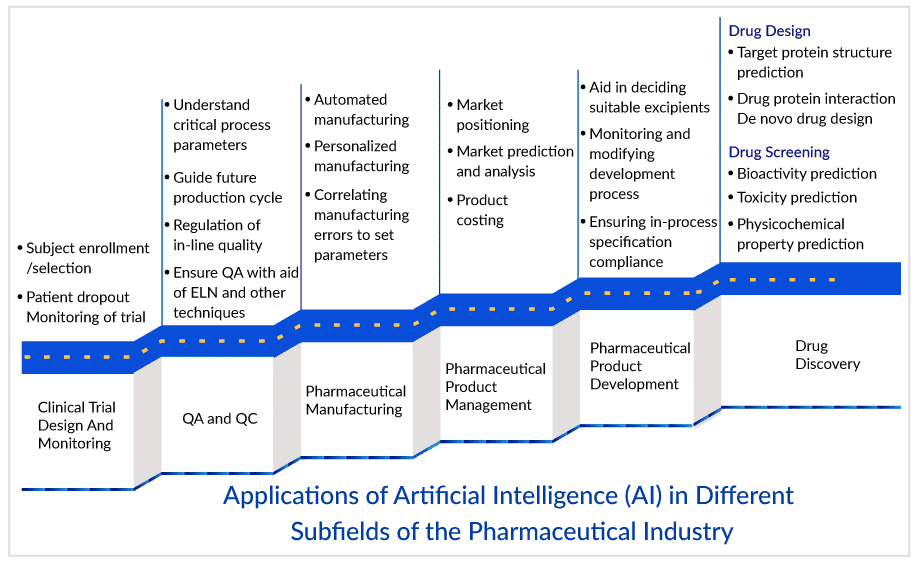Utilization of Artificial Intelligence for Drug Commercialization
Mar 15, 2023
Table of Contents
The amount of health and “omics-related data” produced and stored has increased exponentially during the last few decades. In clinical trials, patient data can be gathered in real-time and examined using various artificial intelligence (AI) techniques; mobile devices can also be utilized to enhance certain facets of disease diagnosis and treatment. AI can also be employed in creating novel medications or repurposing existing ones, the quicker detection and more effective treatment of a variety of disorders, and the identification of data-driven hypotheses for scientists.
Artificial intelligence (AI) revolutionizes how drugs are developed, tested, and commercialized. With the help of AI, pharmaceutical companies can speed up the drug development process, increase the accuracy of clinical trials, improve the targeting of drugs to specific patient populations, predict consumer demand, and help optimize marketing strategies. Furthermore, experts can also gain a competitive advantage across all pharmaceutical specializations, whether in the area of sales or offering crucial medical consultation through AI-generated insights. Insights can also materialize fast with a system that analyses data from every company level, assisting teams in making the best decisions.
Downloads
Article in PDF
Recent Articles
- Breakthrough Device Designation granted to the AI Software for CTEPH
- Opioid-Induced Respiratory Depression: Unveiling the Silent Threat
- Aerin Medical’s RhinAer Stylus; CE Mark for Haemonetics’s VASCADE Vascular Closure Device; J&...
- DNA Sequencing Market: Unveiling Innovations and Key Trends Shaping the Market Growth
- Viz.ai’s AI Algorithm for Abdominal Aortic Aneurysm; BrainTale Unveils the New Version of I...

Several pharmaceutical firms have invested in AI and continue investing in it. They have also collaborated with AI firms to build crucial healthcare solutions. For instance, Insilico Medicine, a clinical-stage artificial intelligence (AI)-driven company, entered into a strategic research collaboration with Sanofi which will leverage Insilico Medicine’s AI platform, Pharma.AI, to advance drug development candidates for up to six new targets (InSilico Medicine, 2022).
Artificial Intelligence in Drug Commercialization
Over a very short period of time, Artificial intelligence (AI) has created a significant impact across different industries. Similarly, it is transforming the pharmaceutical industry, and revolutionizing the verticals, from drug discovery to development and commercialization. With innovative applications, AI provides a huge scope for reducing the time and cost of bringing new drugs to market while improving patient outcomes.
One of the most significant applications of AI is in drug discovery. AI algorithms can analyze vast amounts of data, including genomic, proteomic, and metabolomic data, to identify potential drug targets and predict the efficacy of new drugs. This can significantly reduce the time and cost involved in traditional drug discovery methods.
Another application of AI in drug commercialization is also gaining huge attention among industry leaders, key players, and researchers. AI in drug commercialization can improve the efficiency of the drug supply chain. AI algorithms can analyze supply chain data to optimize inventory management, reduce waste, and improve logistics.
It can reduce the time and cost of bringing new drugs to market, improve patient outcomes, and reduce waste in the drug supply chain. As AI technology advances, several new changes are anticipated to take place in drug discovery, development, and commercialization.
Some of the key applications of Artificial Intelligence In the Drug Commercialization Market include –
Artificial Intelligence (AI) in Market Prediction and Analysis
To make decisions utilizing prediction tools, AI provides a thorough analysis of a product’s fundamental requirements from the client’s perspective and an understanding of the market’s demand. AI-based software displays adverts that, with just one click, take users to the product’s website, enticing them to buy and raising awareness among doctors. Additionally, these techniques assess client keyword input and correlate it with the likelihood of buying the goods using tools for natural language processing (Paul et al., 2021).
For instance, the 2018-founded ODAIA developed Maptual, which helps similarly. It is an AI-powered platform intended to speed up the sales of pharmaceuticals. The platform analyzes client touchpoints to increase commercial success and offers real-time, personalized insight into their behavior using data analytics, process mining, and machine learning (ODAIA, 2021).
Role of Artificial Intelligence in Better Product Cost
The company determines the ultimate price of the product based on the market assessment and the costs associated with developing the pharmaceutical product. Through machine learning (ML), the program analyzes vast sets of statistical data, such as product development costs, market demand for the product, inventory costs, production costs, and rivals’ product prices, and then develops algorithms for estimating the product price.
AI tools like Intelligence Node, a full-featured retail competitive intelligence platform, analyze competitor pricing data and assist businesses and retailers in keeping track of the competition. The ability to set the price of a product is provided by Wise Athena and Navetti PricePoint, which suggests that pharmaceutical companies could utilize them to help with product costs.
Improved Market Positioning With Artificial Intelligence (AI) Applications
Market positioning is the process of giving a product a distinct identity in the marketplace to entice customers to purchase it. As such, it is a crucial component of almost all business strategies for organizations to forge their own distinctive identities. Using this strategy, the pioneer brand Viagra was targeted by the company not only for the treatment of men’s erectile dysfunction, but also for other issues that impacted the quality of life.
Companies use search engines as one of the technology platforms to gain prominence in internet marketing and aid in product positioning. Other technologies, like statistical analytic techniques and particle swarm optimization algorithms, currently, offer a more accurate understanding of markets. Based on a precise forecast of consumer demand, they can assist in deciding the product’s marketing strategy (Paul et al., 2021).
Use of Artificial Intelligence for Optimized Promotions
AI is ideal for automating tedious jobs like data input or lead creation, much like in other fields and applications. It can also be used to give salespeople immediate feedback. When introducing new products, utilizing this feedback can assist in modifying strategy and cutting out development tasks.
Moreover, AI can be used to build and target marketing materials and find the most effective channels for interacting with potential clients. AI can also be used to track and anticipate client preferences and behavior. Therefore, the likelihood that communications and offers will be accepted can be increased by using this information to tailor them.
Market Segmentation and KOL Targeting With Artificial Intelligence (AI)
Effective targeting and the customization of marketing strategies depend on market segmentation. However, failing to comprehend clients is one of the most frequent causes of launch expectations being exceeded. Understanding unmet requirements and identifying pertinent Healthcare Professionals/Patient groups are critical for biopharma. Solutions for market segmentation powered by AI can find ways to boost business performance and increase the product value proposition for various geographies and healthcare systems.
Moreover, pharmaceutical companies require efficient field force targeting techniques to maximize commercialization. With the help of triangulated prescription, Key Opinion Leader (KOL), facility type, and epidemiological data, Innoplexus, a company providing AI and Blockchain-powered data analytics solutions, developed a self-learning ontology trained to recognize life sciences terminology and comprehend concepts. It enables the recognition of KOLs, including presidents of medical associations and foundations, leaders in the life sciences and medical field, professionals from the pharmaceutical sector, public speakers, and researchers. Through network analysis and research graphs, this specialized life sciences ontology also enables the discovery of outside business opportunities.
Artificial Intelligence in Drug Commercialization – Future Analysis and Key Perspective
Drug research and development takes a long time and costs a lot of money; hence more creative methods and approaches must be employed. The advancement of artificial intelligence and its impressive tools consistently attempts to lessen the difficulties faced by pharmaceutical firms, impacting both the drug development process and the lifecycle management of the product. The significance of automation will increase due to the use of the most recent AI-based technologies, which will shorten the time it takes for products to reach the market while also improving product quality, production process safety overall, and resource usage.
The healthcare industry currently faces several difficult problems, such as rising drug and therapy costs, and society requires specific significant reforms in this field. Through rigorous and in-depth market analysis and forecasting, Artificial Intelligence can help establish the product’s safety and efficacy in clinical trials and ensure correct positioning and costing in the market. Although the companies have only recently initiated the use of AI-based methods in drug commercialization in the market, and certain implementation issues still exist, with the rise of innovative AI solutions, AI is expected soon to become a priceless tool in pharmaceutical commercialization and business.

Downloads
Article in PDF



